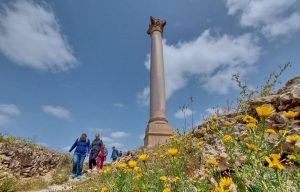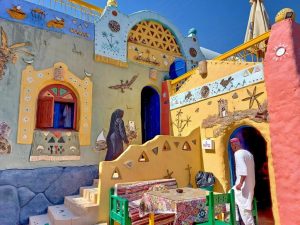The Bibliotheca Alexandrina is a major library and cultural center located on the coast of the Mediterranean Sea in Alexandria, Egypt. The library is a revival of the ancient Library of Alexandria and is commemorated to honor its past splendor.
The idea of reviving the old library dates back to 1974 when Alexandria University instituted a committee to select a plot of land for its new library near the campus and seafront. Construction of the library began in 1995 and has since then been inaugurated in 2002, following an expenditure of approximately US$220 million. Today, it is one of the most extensive and renowned libraries in the world.
The Bibliotheca Alexandrina houses a vast collection of books with shelf space for eight million volumes. The main reading room spans 20,000 square meters and has eleven cascading levels. It also has a conference center, four museums, four galleries for temporary exhibitions, fifteen permanent exhibitions, a planetarium, and a manuscript restoration laboratory.
Additionally, the library has six specialized libraries for the arts, multimedia, young people, children, rare books and special collections, and microforms. The Taha Hussein Library for the visually impaired is a unique feature of the Bibliotheca Alexandrina. It provides special software for the blind and visually impaired to read books and journals.
The library also contains a Nobel Section that has book collections of Nobel Prize Laureates in Literature from 1901 to the present. It has a partnership with the Internet Archive built to preserve heritage for future generations and provide universal access to human knowledge.
The Bibliotheca Alexandrina is also home to notable international institutions such as the Arab Regional Office of the Academy of Science for the Developing World, the International Federation for Library Associations Regional Office, and the Secretariat of the Arab National Commissions of UNESCO.
The library is open to the public and has a mission to be a center of excellence in knowledge production and dissemination and to promote dialogue, learning, and understanding between peoples and cultures.
In conclusion, the Bibliotheca Alexandrina is a unique and remarkable library that comprises various facilities and specialized libraries. It is a cultural and intellectual center promoting learning and understanding, an institution for exchange between cultures and scientific and humanistic disciplines, and a platform for dialogue between different opinions and views. It is certainly worth a visit for anyone interested in books, history, or culture.










